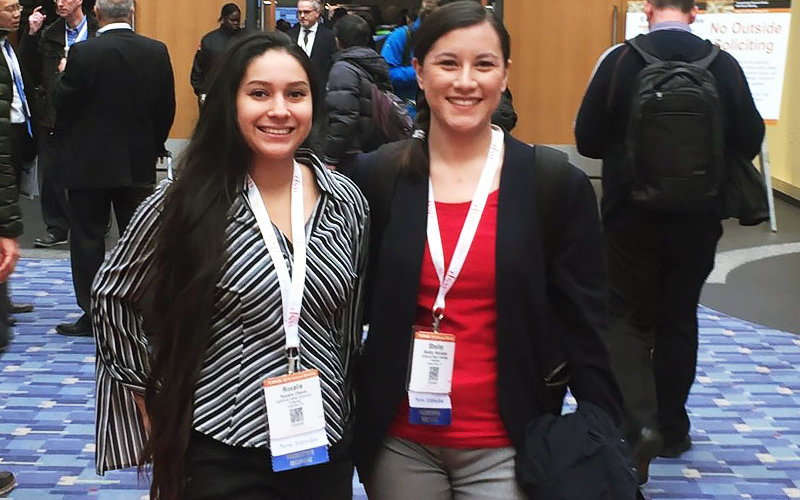
Many highways and railways are built near natural or manmade slopes or on top of soil conditions, which during an earthquake or rain-induced landslide, could cause major damage to roads and tracks.
With today’s society depending on efficient transportation systems, and to find ways to minimize damage to existing transportation systems in such disasters, three Cal State Fullerton civil engineering students have been awarded fellowships from the Dwight David Eisenhower Transportation Fellowship Program for Hispanic-Serving Institutions.
The U.S. Department of Transportation-Federal Highway Administration competitive awards support the students’ transportation-related research projects on slope and soil instability.
The CSUF awardees are undergraduate Yuliana Carrillo, $10,000, and graduate students and alumnae Shelley Rodriguez, $7,500, and Rosalie Chavez, $5,000. As fellows, the students also attended the January meeting of the Transportation Research Board in Washington, D.C.
“The Eisenhower Transportation Fellowship provides students with an opportunity to conduct research leading to better, safer and more economical infrastructure,” said Beena Ajmera, CSUF alumna and assistant professor of civil and environmental engineering. Ajmera ’12 and ’11 (M.S. civil engineering; B.S. civil engineering and B.A. mathematics-applied mathematics), the students’ faculty mentor, is a two-time recipient of the award when she was a CSUF student.
“The connections that develop and the work that results from the fellowship stems far beyond the duration of the award and their educational experiences. My experience has been that the fellowship and the prestige associated with it will extend into the student’s professional career indefinitely.”
For Carrillo, the award will allow her to continue transportation research of rainfall-induced slope failures and how it relates to transportation issues. For her project, she will use a clay soil sample collected from a slope failure after a major rainfall in Mission Viejo.
“My goal is that my research will yield a better understanding of the factors influencing the stability of clay slopes during rainfall events,” added Carrillo, who was invited to present her project at the Transportation Research Board’s Research Showcase. “The results also could have long-standing benefits to the engineering profession, the local communities and society in general.”
Chavez’s research project also focuses on slope instability to better understand the factors that trigger landslides, and how slope instability affects nearby transportation infrastructure and potentially could cause damage.
“If a slope fails, blocking means of transportation, it can lead to a complete economic disaster, affecting public health, the environment and time spent to clean up the mess,” said Chavez, ’17 (B.S. civil engineering). “Being able to better predict under what conditions a slope may fail can prevent such damages.”
Rodriguez ’17 (B.S. civil engineering) is focusing on analyzing the strength loss in clay soil by performing tests on soil samples prepared in the laboratory.
“These shear tests apply horizontal and vertical loads on the soil to simulate an earthquake. The results are then used to evaluate the reduction in the strength as a result of the earthquake shaking,” she explained.
“It’s important to know the strength of the soil, so when an earthquake hits, we can know at what magnitude the soil will fail and take preventative measures beforehand.”